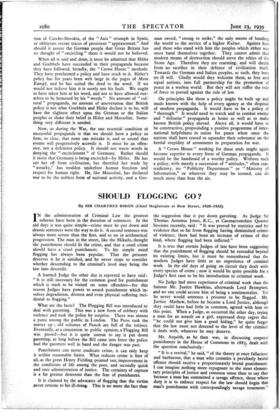SHOULD FLOGGING GO ?
By SIR CHARTRES BIRON (Chief Magistrate at Bow Street, 1920-1933)
IN the administration of Criminal Law the greatest reforms have been in the duration of sentences. In the old days it was quite simple—crime must be put down and drastic sentences were the way to do it. A second sentence was always more severe than the first, and so on in arithmetical progression. The man in the street, like the Mikado, thought the punishment should fit the crime, and that a cruel crime should have a cruel punishment. To his simple mind flogging has always been popular. That the prisoner deserves it he is satisfied, and he never stops to consider whether descending to the criminal's level may bring the law into discredit.
A learned Judge the other day is reported to have said: " It is still necessary for the common good for punishment which is stark to be visited on some offenders—for this reason Judges have power to award punishment which in- volves degradation, distress and even physical suffering inci- dental to flogging."
What are the facts? The Flogging Bill was introduced to deal with garotting. This was a new form of robbery with violence and took the police by surprise. There was almost a panic among the public in London. The Press took the matter up ; old volumes of Punch are full of the subject. Eventually, as a concession to public opinion, a Flogging Bill was passed—but it is quite untrue to say it put down garotting, as long before the Bill came into force the police had the garotters well in hand and the danger was past.
Punishment can never eradicate crime, it can only keep it within reasonable limits. What reduces crime is first of all, as the great Henry Fielding pointed out, improvement in the conditions of life among the poor, and secondly quick and sure administration of justice. The certainty of capture is a far greater deterrent than the fear of punishment.
It is claimed by the advocates of flogging that the victim never returns to his ill-doing. This is no more the fact than the suggestion that it put down garotting. As Judge Sir Thomas Artemus Jones, K.C., at Caernarvonshire Quarter Sessions recently, said : " It was proved by statistics and by evidence that so far from flogging having diminished crimes of violence, there had been an increase of crimes of that kind, where flogging had been inflicted."
It is true that certain Judges of late have been suggesting that the punishment of flogging should be extended beyond its existing limits, but it must be remembered that the modern Judges have little or no experience of criminal work. In the old days of going on circuit they dealt with every species of crime ; now it would be quite possible for a Judge's first case to be his introduction to criminal work.
No Judge had more experience of criminal work than the famous Mr. Justice Hawkins, afterwards Lord Brampton, and no one could accuse him of being a sentimentalist. Yet he never would sentence a prisoner to be flogged. Mr. Justice Mathew, before he became a Lord Justice, although they could have had little in common, agreed with him on this point. When a Judge, as occurred the other day, trying a man for an assault on a girl, expressed deep regret that " he could not give him a good hiding," he quite forgot that the law must not descend to the level of the criminal it deals with, whatever he may deserve.
Mr. Asquith, as he then was, in discussing corporal punishment in the House of Commons in 1885, dealt with the question conclusively: " It is a revival," he said, " of the theory at once fallacious and barbarous, that a man who commits a peculiarly brutal offence should receive a proportionately brutal punishment. I can imagine nothing more repugnant to the most elemen- tary principles of justice and common sense than to say that because a man has committed a savage offence, those whose duty it is to enforce respect for the law should begin that man's punishment with correspondingly savage treatment."










































 Previous page
Previous page